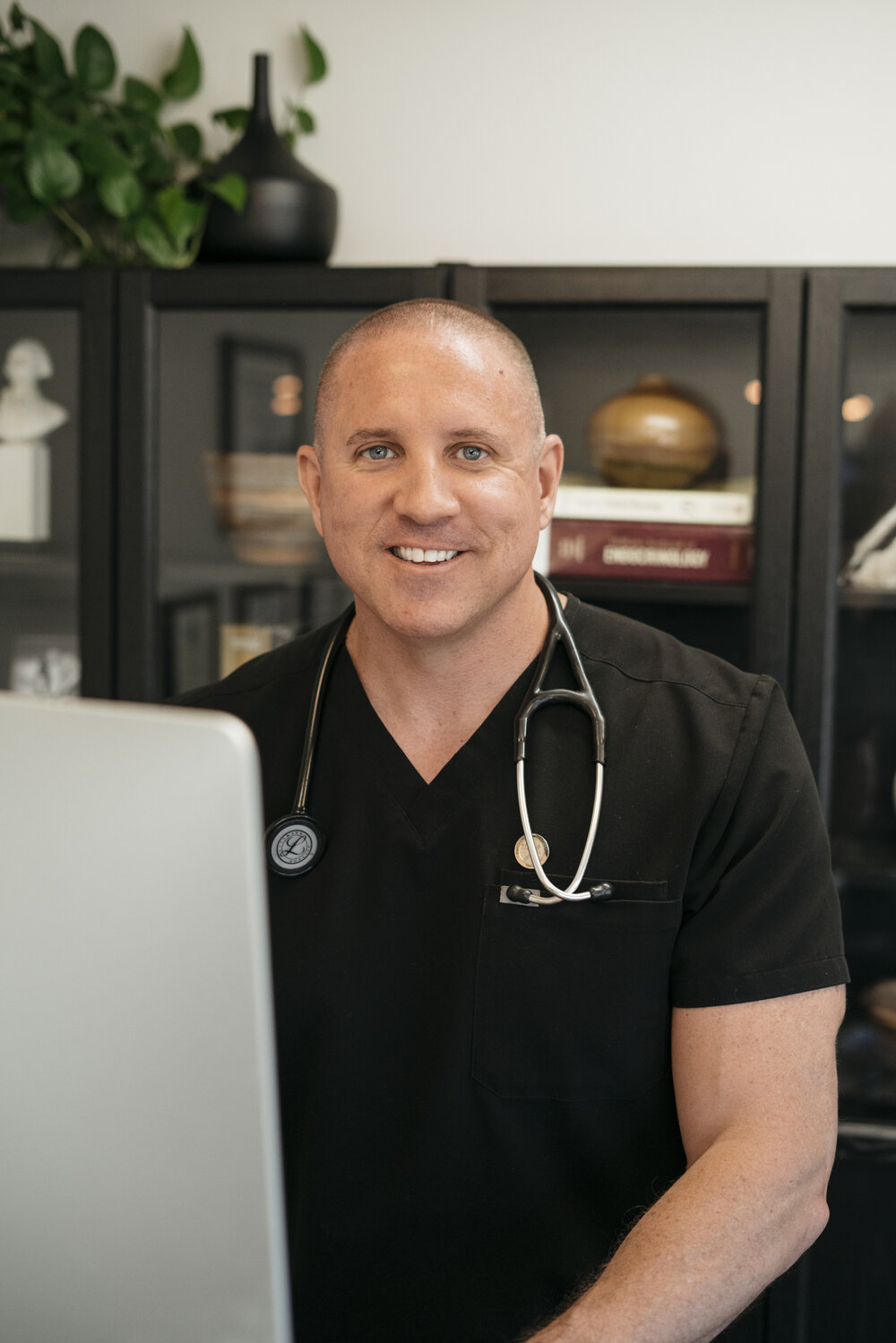Testosterone Replacement Therapy in Orange County
Each patient receives a customized health plan designed to match the hormone levels they had when they were 20 years old.

Do any of these symptoms sound familiar?
The symptoms below are signs of low testosterone. Any one of these could indicate that a man’s testosterone levels have dropped below what is considered to be optimal.
Low Energy
Testosterone is the hormone of strength, durability, and endurance. Without it, fatigue becomes a daily routine. All men feel exhausted from time to time. This is natural. However, men who constantly feel exhausted are likely to have low testosterone levels. Never-ending fatigue, or feeling like you can’t function for more than a few hours without dozing off, can grind your life to a halt and leave you with only a fraction of your true potential.
Declining Libido
To men who find themselves without a healthy sex drive, it may feel like their libido is withering away. Suddenly, a once-healthy sex drive starts to wane, decreasing to once every few weeks, then once a month, and eventually nothing. Attraction to your partner begins to feel like a chore, straining the relationship. This decrease in libido sometimes corresponds to a testosterone level that is lower than normal.
Weak Erections
It’s difficult to talk about and embarrassing. When a man’s testosterone level falls below the normal range, intimate moments suffer the hardest. Being unable to perform sexually or maintain an erection is a source of frustration for men with low testosterone. It can lead to a dark place mentally that’s hard to come out of. However, it doesn’t have to be permanent. Awareness that this is a sign of low testosterone is the first step towards treatment, recovery, and prevention.
Depression
Low testosterone makes it harder to regulate your emotions. You no longer feel like yourself. You may find yourself more emotional over things that wouldn’t have bothered you otherwise. Testosterone stimulates dopamine, the reward hormone that makes us feel like life is rewarding and satisfying. Without it, the risk of developing depression increases.
Decreased Muscle & Strength
Reduced muscle tone, difficulty gaining muscle, low stamina, and an overall feeling that your strength is fading away are symptoms of low testosterone. This general weakness makes it harder to maintain proper muscle tone and maintain a healthy weight, even if your diet and workout routines persist.
Decreased Performance + Concentration
Low T affects cognitive function. Your brain uses testosterone to boost verbal cognition, spatial memory, and overall mental function. With low testosterone, mental capacity declines and brain fog become a recurring issue, taking your focus, clarity and motivation with it — symptoms that only get worse with age.

You're in good company: 1 in 4 men over the age of 30 have low testosterone.
What Our Patients Are Saying
Our Process
Health Assessment
Consultation
Personalized Treatment Plan
Meet Dr. Sean Breen
Dr. Breen is board-certified in Anti-Aging, Regenerative, and Functional Medicine and is internationally recognized as an expert in Bioidentical Hormone Replacement Therapy (BHRT) for both men and women.
He has established a world-renown medical practice that implements proprietary methods that truly give people back their health and their lives. He has helped thousands of patients from all over the world achieve the level of optimal health they’ve always wanted. From his progressive, preventive approach, Dr. Breen and his team of experts transform lives and preserve health.
Before his successful private practice, Dr. Breen served in the United States Marine Corps and has been awarded a Navy and Marine Corps Achievement Medal with Valor. For nearly a decade, he served as a Naval medical officer and battalion surgeon both stateside and overseas during his deployment in Iraq, supporting US Marines.
Dr. Breen is happily married to the love of his life, Erin. He and his wife have been blessed with three wonderful children. They currently reside in Orange County, California.
Experience & Expertise
- Trained in bioidentical hormone therapy (BHRT) with Dr. Neal Rouzier who is world-renowned for his work and research in natural hormone replacement therapy
- Renowned expert in balancing hormones and is sought after by patients throughout the country
- 9 Year military career as a Navy Medical Officer
- 4 years as a Battalion Surgeon with the 1st Marine Division at Camp Pendleton, California
- New York College of Osteopathic Medicine Graduate
- GAINSWave™ and P-Shot certified provider

Frequently Asked Questions
Unfortunately, our healthy aging program plans are not covered by insurance companies.
We can arrange for the phlebotomist to come to you within 24 hours. Please drink lots of water and fast before your blood draw.
No, we are a comprehensive men’s health clinic specializing in functional and regenerative medicine. We handle everything from erectile dysfunction, weight loss, and cardio-metabolic health to general anti-aging treatments for men.
Testosterone Replacement Therapy, or TRT, is a medical treatment involving the administration of hormones to boost or act as a replacement for those with naturally low levels of testosterone.
- Week 1-2:
Increase in mental alertness, clarity and energy. Symptoms of mild to moderate depression are alleviated. A generally improved enthusiasm for your daily life. - Week 2-3:
Better results in muscle tone from exercise and weight control efforts. More energy. More motivation. An increase in sex drive. - Week 3-4:
Increased sexual desire and spontaneous morning erections.
Testosterone is replaced by using either an injection or a transdermal topical cream.
Yes, there are numerous studies showing the safety of testosterone therapy.
A book that dives deeply into the importance and various astounding effects of testosterone is “Testosterone for Life: Recharge Your Vitality, Sex Drive, Muscle Mass, and Overall Health”, by Harvard Urologist Dr. Abraham Morgantaler.
As with any medical treatment, there is always a chance of minor side effects. All our treatments and programs are designed to minimize these effects. Our doctor prescribes only medically appropriate dosages, and follow-up lab testing is done to ensure the correct hormone levels are being maintained so no ill effects are experienced.
TRT Therapy in Irvine, CA
Of all the hormones in the male body, testosterone is the most distinct. Without testosterone, men lose the vital masculine traits that identify them as male. Testosterone goes beyond being a “male sex hormone”. It upregulates dopamine, the reward-seeking hormone that gives you drive, desire, and passion to live life to the fullest. It also allocates body fat, builds muscle mass, and maintains bone density.
Our practice is founded on three principles:
- Low testosterone can infiltrate every area of a man’s life.
- For younger men, the loss of vitality that comes from low testosterone can hit hard. From losing strength to total body exhaustion, difficulty maintaining weight, loss of body hair and the mental challenges that come with it.
- They can do something about it.
Most men experience a steady decline in testosterone as they age. Often, symptoms of low testosterone are attributed to anything but low T. Low testosterone can be misdiagnosed as stress, insomnia, depression, diabetes, heart failure, anemia, and so on.
The signs of low testosterone in men can also be hard to pin down. If you’ve had a hectic week, symptoms like excessive fatigue, increased body fat, and difficulty staying and falling asleep may fly under the radar. Symptoms like decreased muscle mass, sleep apnea, and changes in cholesterol metabolism are noticed later, or attributed to something else.
Some of the most apparent signs of low testosterone are a lowered desire for sex and changes in the function and size of male genitalia—including:
- Difficulty getting and maintaining erections.
- Reduction in testicle size.
- Reduction in the amount of semen produced.
Some men with low levels of testosterone may have hot flashes and difficulty with emotional regulation, often resulting from irritability and a lack of focus.
Conditions like an injury to the testicles, hormonal disorders, Type 2 diabetes, HIV/AIDS, and chronic liver or kidney disease can lead to a lower than normal testosterone score on a blood test. Certain genetic conditions and medications can also lower a man’s testosterone levels.
These signs of low T can lead to bigger problems in the future. Lower bone density makes bones more fragile and easy to break Depression or social anxiety may arise as a side effect of emotional regulation issues. Men experiencing sleep apnea due to low testosterone are nearly four times more likely to experience a stroke.
A drop in sex drive and difficulty getting and maintaining erections can affect a man’s fertility and have a psychological effect on his confidence and self-esteem. Testosterone replacement therapy in Orange County, also known as TRT or Low T Therapy, can be delivered orally, through the skin, or through direct implant or injection. Healthy lifestyle changes, along with exercise and a diet rich in specific nutrients, can also increase testosterone levels.
You don’t need to fall ill before getting your testosterone levels checked. The signs of low testosterone can be subtle at first but, if left untreated, can have a significant negative impact.
Regardless of how one feels, it’s always a good idea to test your hormone levels at a clinic as part of a routine checkup. It’s a small thing to keep your body running as optimally as possible.
Dr. Sean Breen is the leading TRT Specialist in Orange County, CA. Throughout his practice, he has brought positive, effective, and evidence-based changes into the lives of many men.
If you’d like to schedule a consultation, please reach out to us in the contact form below, and let us know how you’ve been feeling.
